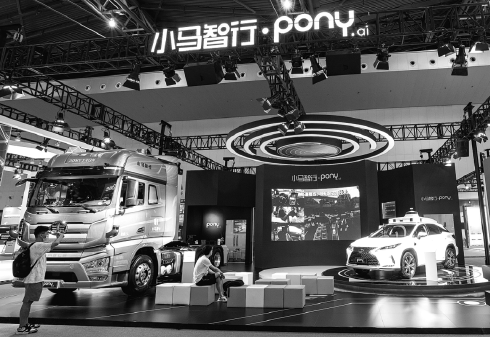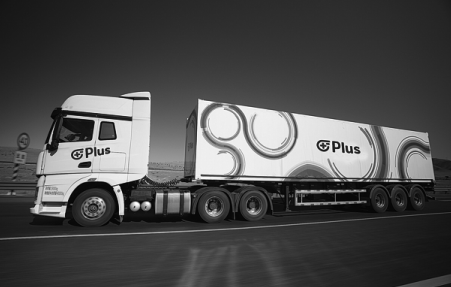Autonomous trucks eye wider applications
Logistics growth, driver shortage prove upsides for surging sector

Commercialization of autonomous trucks is poised to gain impetus as some self-driving startups are beefing up efforts to conduct road tests, pilot commercial freight operations and mass-produce autonomous heavy-duty trucks, driven further by the rapid growth of online shopping and demand for faster deliveries.
Chinese autonomous driving startup Pony.ai has been making forays into the self-driving truck segment. Li Hengyu, vice-president of Pony.ai and head of the company's truck division, said the company has been conducting tests of autonomous trucks for over 200 days.
So far, its self-driving trucks have hauled about 13,650 metric tons of freight, with a commercial operation mileage of 37,466 kilometers.
Li said there is huge development potential for autonomous driving in the logistics segment, and the core value of self-driving trucks is to liberate manpower when facing the huge driver shortfall in the sector.
"We have been exploring how to empower and change the logistics industry with autonomous driving technologies," he added.
Pony.ai's truck division was established last year. It obtained a permit to test its autonomous trucks on public roads in Guangzhou, capital of Guangdong province, in December.
In March, the company unveiled its autonomous truck business brand PonyTron. Its smart logistics subsidiary, based in Guangzhou, was granted a freight road transport business permit from local authorities in Nansha district, Guangzhou, on April 21. The subsidiary has put its autonomous trucks into commercial operation after receiving the permit.
Truck logistics will become a key application scenario for the company's autonomous trucks, said the firm. It hopes to test self-driving trucks on more expressways, providing safer and more effective solutions to fill the labor gap, as well as improving logistics efficiency.
According to a report by Beijing-based think tank EqualOcean, the number of heavy-duty trucks in China's logistics system is expected to reach 6.27 million in 2030, with the revenue from autonomous trucks deployed in such logistics reaching 853.9 billion yuan ($131.8 billion).
Established in 2016, Pony.ai had raised over $1.1 billion by the end of February from investors, including Japanese automaker Toyota, pushing its valuation to more than $5.3 billion.
"Autonomous driving is still at an initial stage. It will become a pivotal part of smart transportation and drive the construction of smart cities, with far-reaching impacts, such as improving the overall economy and changing the way people travel," said Peng Jun, co-founder and chief executive officer of Pony.ai.
The Ministry of Transport said China's road freight totaled 34.2 billion tons in 2020, compared with 41.6 billion in 2019.
The country plans to allow autonomous vehicles to be tested on highways, according to a draft guideline published by the Ministry of Industry and Information Technology in January.
The MIIT said there is a need to expand the scope of road tests and pilot applications of intelligent connected vehicles to include highways, due to the emergence of domestic self-driving technologies for expressways, but efforts will be made to ensure safety.
Apart from self-driving trucks, Pony.ai is ramping up efforts to expand its passenger-carrying robotaxis into more Chinese cities. In July, the company launched its robotaxi service in Shanghai, following Guangzhou, Beijing and California in the United States.
A fleet of Lexus RX models equipped with Pony.ai's autonomous driving solutions hit the streets in Shanghai in July. Meanwhile, the company unveiled its long-range lidar sensor Iris, codeveloped with lidar maker Luminar Technologies, with an aim to start mass-producing its L4 autopilot system based on the technology in 2023. L4 automation means the car can drive by itself under most circumstances without a human backup driver.
Plus, an autonomous trucking startup is speeding up mass production and global deployment of its supervised L4 autonomous driving technology. In June, the company completed a driverless L4 truck demonstration on the Wufengshan highway in Jiangsu province, with plans to launch pilot operations of a fully driverless truck for use in a dedicated environment in 2022.
It has collaborated with FAW Jiefang, China's oldest and largest truck manufacturer, to develop autonomous trucks. Plus said mass production of FAW J7 intelligent trucks powered by PlusDrive, its supervised L4 autonomous driving solution, is expected to start in the third quarter.
In addition, courier company SF Express has selected Plus for China's first commercial freight pilot to demonstrate how supervised autonomous trucks improve logistics operations.
As part of the ongoing pilot, Plus ran its autonomous trucks on two long-haul routes-Wuhan to Wuxi (1,440 km round-trip) and Changshu to Wuhan (1,600 km round-trip).
"Thanks to the convergence of machine learning and artificial intelligence, big data, mobility and advanced sensors, the autonomous revolution is on the horizon. Autonomous trucks are one of the best applications for autonomous driving in the near term, and this application is close to becoming a reality," said David Liu, CEO and co-founder of Plus.
"We are on track to start mass production of autonomous trucks this year", Liu said, adding that large-scale use of autonomous driving technologies is conducive to making freight transportation on expressways safer, lowering costs and enhancing operational efficiency.
The company is also working with Iveco, one of the top global truck manufacturers in the world, to jointly develop autonomous trucks that will be deployed across China, Europe and elsewhere.
Based both in the United States and China, Plus is developing low-cost, high-performance full-stack L4 autonomous driving technologies to make long-haul trucking safer, more efficient and more sustainable.
According to Allied Market Research, a global consulting services provider, the global self-driving truck market may have generated $1 billion in 2020 and is further expected to generate $1.67 billion by 2025, growing at a compound annual growth rate of 10.4 percent from 2020 to 2025.
"At present, autonomous trucks are mainly tested or applied in relatively simple scenarios, such as ports, mines and some closed roads," said Jiang Zheng, an expert at the research and development center affiliated to Guangzhou Automobile Group.
Jiang said that compared with self-driving passenger-carrying robotaxis, the routes of autonomous trucks are more fixed, which provides certain conditions for the large-scale commercialization of autonomous driving technology.
"In addition, logistics companies see rising demand for autonomous trucks which increases work efficiency, saves labor costs as well as reduces delivery and transportation costs," said Jiang, adding that he is bullish on autonomous truck prospects.
The Chinese government is also quickening the commercialization of autonomous driving technology, and formulating guidelines to allow self-driving companies to test their vehicles in a wide range of scenarios, Jiang said.
TuSimple, another self-driving truck startup that went public earlier this year, is slated to mass-produce its L4 self-driving semitrucks in cooperation with truck maker Navistar.
It has obtained intelligent connected vehicles demonstration application qualification in Shanghai, and plans to carry out road tests on designated roads in the Lin-gang Special Area the China (Shanghai)Pilot Free Trade Zone.
Zhang Xiang, a researcher at the automobile industry innovation research center, North China University of Technology, said there are some difficulties and challenges in the process of promoting the commercial use of self-driving trucks.
"The operational costs of self-driving trucks equipped with advanced sensors and radars are much higher than conventional trucks. Moreover, it is a little bit difficult for authorities to manage such long-haul trucks, whose operational range covers several provinces."
Zhang said more efforts are needed to make breakthroughs in key technologies, supervision, relevant laws and regulations to promote the commercialization of self-driving technologies.


Today's Top News
- PLA Daily: China resolute in winning anti-graft war
- Davos meet lays bare tensions and challenges
- Growth gaining traction amid upbeat outlook
- Bowl of laba serves as prelude to harmonious new beginnings
- Visit highlights cooperative nature of China-Europe ties: Editorial
- Placating bully with concessions 'fool's errand': China Daily editorial






























